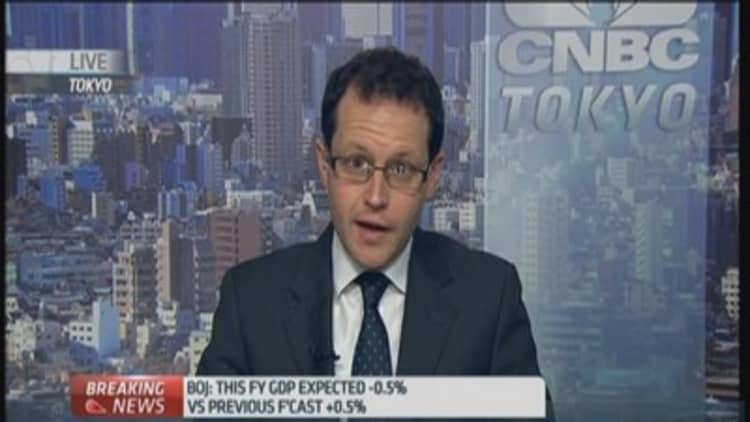Bank of Japan (BOJ) Governor Haruhiko Kuroda has frustrated investors with his habit of surprising markets, and now the central bank's latest inflation forecast has some questioning his credibility.
"Now that the BOJ has admitted to failing to meet its target and put its credibility on the line, the risk is that another round of asset purchases could provoke a negative reaction," said Hiroaki Hayashi, at Fukokushinrai Life Insurance director of investment management, who expects the BOJ to ease further in April.
On Wednesday, the BOJ cut its inflation forecast for the fiscal year starting in April 2015 to 1.0 percent, half of the 2 percent target it set nearly two years ago. The central bank cited the around 50 percent decline in oil prices over the past six months for the updated forecast, which was lower than many analysts had expected.
Officially, the central bank expects to exceed its 2 percent forecast in fiscal 2016, raising its core inflation forecast to 2.2 percent from 2.1 percent.
Hard to believe
Apparently undeterred, Kuroda insisted the 2 percent target will be met, just a little later than expected.

"Consumer inflation will slow for the time being due to oil price falls," he said at the press conference following the BOJ's two-day policy meeting. "On the assumption that oil prices will flatten out at current levels and rise moderately ahead… we expect consumer inflation to reach 2 percent in a period centered on fiscal 2015."
"Governor Kuroda is being his bullish self – he really does believe his forecasts can be achieved. The point is to raise expectations that inflation will rise," explained Mizuho Securities market economist Kenta Ishizu. Although he conceded that "most people in the markets don't think the 2 percent inflation is going to become a reality."
But analysts aren't convinced.
Read MoreBank of Japan: To bazooka or not
"The slowdown in inflation in recent months has little to do with lower energy costs," said Capital Economics Marcel Thieliant in a note. "We continue to think that policymakers are too sanguine on inflation."
"The new forecast of 1.0 percent is half the price stability target. It looks very much as if the bullish scenario that the year-on-year inflation rate will accelerate gradually and reach around 2 percent in or around fiscal 2015 lies in ruins, battered by the headwinds created by the oil price slide," said Mizuho Securities' Chief Market Economist Yasunari Ueno in a note.
But the BOJ's "position is to insist that the large downward revision to the fiscal year 2015 forecast is merely a brief decline that reflects a one-time move in oil prices," Ueno added.
Whatever easing it takes
With the BOJ's inflation target out of reach, many analysts believe the central bank will have to undertake further easing measures.
"As long as the BOJ holds on to its 2 percent [inflation] target, we believe market expectations for additional quantitative easing will only strengthen, raising the possibility of the central bank falling into a trap of its own making," said Deutsche Bank currency strategist Taisuke Tanaka in a note.
While many analysts believe another round of quantitative easing is on its way, possibly as soon as April, they're also questioning whether more asset purchases would have the desired effect.
So far, the results of the BOJ's easing efforts have been mixed. The central bank launched an unprecedented asset purchase program in April 2013 and expanded that program in October 2014 to 80 trillion yen per year. Stock markets rallied and the yen weakened sharply against the U.S. dollar since the easing program was launched, boosting profits at Japan's blue chip exporters.
But the BOJ's government bond purchases have sent yields into negative territory, raising fears that the credit markets may cease to function. This week, the yield on five-year government bonds followed shorter maturities into negative territory before bouncing back up to 0.049bp on Thursday.
The benchmark 10-year, which was trading at 0.306bp on Thursday, "will probably fall into negative territory too," said Fukokushinrai Life Insurance's Hayashi.

